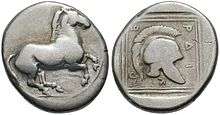Perdiccas II of Macedon
| Perdiccas II | |
|---|---|
| King of Macedon | |
 silver stater Perdikkas II | |
| Reign | traditional: 451–413 BC |
| Predecessor | Alcetas II |
| Successor | Archelaus I |
| Spouse |
Simache Cleopatra |
| Issue | Archelaus I |
| Dynasty | Argead |
| Father | Alexander I |
| Mother | unknown |
| Religion | Ancient Greek religion |
Perdiccas II (Greek: Περδίκκας Β΄) was a king of Macedonia from about 448 BC to about 413 BC.
Family
Perdiccas II was the son of of Alexander I, by whom he had four brothers, Alcetas II, Philip, Menelaus and Amyntas,[1] and a sister, Stratonice. Alcetas II preceded him on the throne until his murder at the hands of Perdiccas' son Archelaus I resulted in Perdiccas' elevation.[2] Menelaus was the father of king Amyntas II, while Amyntas' grandson was king Amyntas III.[1]
Circa 429/8, Perdicas arranged the marriage of his sister Stratonice to Seuthes II of Thace.[3]
Perdiccas II married first a woman called Symache or Simiche. While some consider her a woman of unknown lineage but probably part of the Macedonian elite,[3] other sources call her a slave.[4] By her, he had two sons, Archelaus I and Aeropus. He later married a woman named Cleopatra, by whom he had another son. Cleopatra's son, according to Plato, was eliminated by her step-son Archelaus I because he was the legitimate heir.[4]
Background
After the death of Alexander I in 454, Macedonia began to fall apart. Macedonian tribes became almost completely autonomous, and were only loosely allied to the king. By 434, Perdiccas' younger brother Philip was challenging Perdiccas for the throne, having enlisted the support of Athens and King Derdas of Elimea. Perdiccas responded by stirring up rebellion in a number of Athenian tribute cities, including Potidaea.
Athens responded with force, and sent 1000 hoplites and 30 ships to Macedonia where they captured Therma. They went on to besiege Pydna, where they were met by reinforcements of a further 2000 hoplites and 40 ships. However, as the Athenians were besieging Pydna, they received news that Corinth had sent a force of 1600 hoplites and 400 light troops to support Potidaea.
In order to combat this new threat, Athens made an alliance with Perdiccas, and proceeded to Potidaea. Perdiccas immediately broke the treaty and marched to Potidaea, while the Athenians were eventually victorious, the battle (along with the Battle of Sybota) directly led to the Peloponnesian War.
In 431, Athens entered into an alliance with King Sitalkes of Thrace, after Nymphodorus, an Athenian, married Sitalkes’ sister. Nymphodorus then negotiated an agreement between Athens and Perdiccas, where Perdiccas regained Therma. As a result of this, Athens withdrew her support for Philip, and the Thracians promised to assist Perdiccas in capturing him. In return, Perdiccas marched on the Chalcidians, the people he had originally persuaded to revolt.
However, Perdiccas once again betrayed the Athenians and sent 1000 troops to support a Spartan assault on Acarnania in 429 but they arrived too late to help (Thucydides 2.80). In response to this, Sitalkes invaded Macedonia with the promise of support from Athens. This support never materialized, and Perdiccas once again used diplomacy to ensure the survival of Macedonia. He promised the hand of his sister in marriage to the nephew of Sitalkes, who then persuaded Sitalkes to leave.
After this, Perdiccas was allied to the Spartans and, in 424, helped the Spartan Brasidas to take Amphipolis from the Athenians, one of her most important colonies, mainly for its ready access to timber for her fleets. This was a severe blow to Athens, and would tie them to Macedonian timber for years to come, which strengthened Macedonia’s bargaining power considerably. In return for this, the Spartans helped Perdiccas secure his borders, by leading an assault on King Arrhabaeus of Lyncestis, with the promise of support from the Illyrians (Battle of Lyncestis). However, the Illyrians switched sides and attacked Perdiccas and his Spartan allies. The poorly trained Macedonian troops fled, and so the Spartans also retreated and attacked the Macedonian baggage train in anger. This soured relations between Macedonia and the Peloponnese for years to come, and pushed Perdiccas closer to Athens, allying himself with them in 423.
By 417, Perdiccas had left the Athenians and joined the Spartan-Argive alliance. Just four years later, bowing to Athenian pressure, Perdiccas broke with the Peloponnese, and aided Athens in their attack on Amphipolis.
In 413 BC he died, leaving his son Archelaus as heir.
References
- 1 2 Roisman, Joseph (2010), "Classical Macedonia to Perdiccas III", in Roisman, Joseph; Worthington, Ian, A Companion to Ancient Macedonia, Blackwell Publishing, pp. 145–165, ISBN 978-1-4051-7936-2
- ↑ Paul Lachlan Mackendrick (1980), The North African Stones Speak, UNC Press, ISBN 0-8078-4942-1
- 1 2 Carney, Elizabeth (2000). Women and Monarchy in Macedonia. University of Oklahoma Press. ISBN 0-8061-3212-4.
- 1 2 Plato. Gorgias. Retrieved 10 December 2015.
| Preceded by Alcetas II |
King of Macedon 448–413 BC |
Succeeded by Archelaus I |
